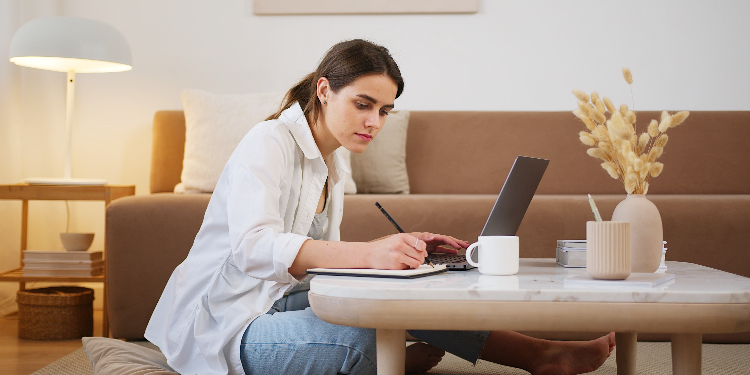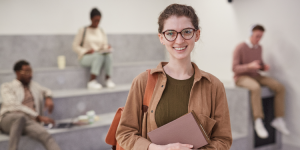
In a climate of uncertainty and change, university students worldwide are adapting or struggling to adjust to the new educational landscape. International students are particularly prone to the unprecedented challenges brought on by Covid-19, such as isolation, online learning, and anxiety. Some students have seen their academic performance deteriorate while others are dealing with additional stress due to financial insecurity, visa hardships, career unpredictability, and lack of support network.
Mental health
According to a study on the pandemic's mental health impacts on international university students, published at Frontiers in Psychiatry, of all students surveyed, 84.7% experience “moderate-to-high perceived stress” and 12.1% go through “moderate-to-severe symptoms of anxiety and depression.” While universities close campuses and shift to online learning, students' anxiety due to the indefiniteness of the measures is on the rise. For international students, Covid-19-related stress develops on top of challenges such as adjusting to the host country's culture, prejudices, being away from family and friends, and using a second language.
To support international students, higher education institutions should understand their needs and worries and increase awareness of mental health problems. For example, the teaching staff should be able to relieve academic and exam-related stress and identify students with symptoms of mental distress. Whereas international students tend to isolate themselves when in crisis, universities should proactively reach out to students to remind them of the existing support measures. Finally, academic institutions should publicise only accurate and transparent information regarding Covid-19 to avoid the spread of panic and encourage prevention.
Accommodation agreements and rent payments
In the academic year 2018/2019, international students made up 20% of the UK's total student population. In Australia, the international student industry provides about 130,000 jobs. In Canada, 721,205 international students arrived in 2018 — the country's largest number ever. International students, and more specifically, the accommodation they rent, represent a significant portion of annual revenues in popular study destinations. Due to Covid-19, student accommodation providers deal with empty rooms or students who are unable to meet their tenancy obligations.
Students who struggle to pay their rent while they remain in the country of study, or students who have returned to their home country but continue to rent student accommodation, should consider making special arrangements with the accommodation provider. Students who are unable to return to the country of study due to travel bans may try to break the lease or negotiate the rental price. On the other hand, governments have announced temporary accommodation schemes and the prohibition of evictions among people who experience financial hardship.
Lack of employment opportunities
The global labour market is witnessing a vast disparity between technology-advanced sectors and businesses that cannot catch up with the remote work movement. The world will likely undergo a new recession, only eleven years after the high unemployment rates and low pays of the 2008-2009 global recession. Students whose graduation and entry to the labour market coincides with the pandemic should expect limited job opportunities, lack of long-term employment, and pay cuts. As a result, students may opt to delay their separation from the academic world by enrolling into another programme back to back. Further education means more skills and a delay in receiving the job market's disappointments in stock.
Interview with an international student in The Netherlands
Valentina, 22, is from Brazil and studies LLM European Law at Leiden University in The Netherlands. When Covid-19 was declared a pandemic, she was in the UK studying her final year of Bachelors. The situation escalated quickly, and Valentina decided to return to her home country for what she thought would be a short period. She stayed in Brazil for three months, before going back to England to pack the rest of her belongings and move out of the student house.
Valentina applied for the LLM programme in The Netherlands in January 2020, and received the offer in February, before the full appearance of Covid-19. Hence, she didn't experience any delays in the application process. But that was not the case for post-application affairs such as accommodation booking and communication with the department. As a dual citizen, Valentina didn't need to apply for a visa to study in The Netherlands. But her friends from Brazil had their visa applications delayed for months due to closed embassies and consulates.
How does the university operate amid Covid-19? What precaution measures have they taken?
During the first semester (September to December 2020) the classes were hybrid meaning that classes with less than 20 students were taught in person. For larger lectures, we had to tune to online teaching, which was either live or pre-recorded. The university gave all students the possibility to do the course 100% online, so even the smaller, in-person classes were also conducted online. Nowadays, due to the new restrictions and lockdown in The Netherlands, studies are being held entirely online. For me, the most shocking thing of all was that in The Netherlands, masks were not mandatory until late November. Thus, we were not obliged to wear a mask in class — a closed space, filled with people. This bothered me a lot because it felt like the Covid-19 situation all over the country wasn't being taken seriously enough.
How does the university ensure the wellbeing and mental health of the students?
They have held some wellbeing workshops and talks, but honestly, I feel like they don't help. At least, I don't feel comfortable talking about my mental health to someone I know will only care momentaneously. I chose to start therapy instead because Covid-19 and lack of interaction have degraded my happiness and wellbeing.
Are you satisfied with lecturers' response to handling virtual communication, informing you on readings, giving feedback, and responding to questions in a timely manner?
Even though the university could have been more responsive, I am tremendously lucky with my lecturers. I think being a master's candidate drives you closer to the academic staff. They have been extremely understanding, and to an extent, they are the closest I have had of friends and interaction during this time. So I am very satisfied with their work and efforts to support me.
Does your programme require an internship?
My programme doesn't require me to do an internship, but as I graduate in July this year, I will need to find a job as soon as possible, which I am incredibly nervous about, given that the current employment situation worldwide is appalling.
How is living on campus amid Covid-19?
I don't live on campus. I live in a shared flat with two other girls who are very conscious about the pandemic. I am grateful for them, and for the dynamics we have going on. However, I am currently in Brazil, where I came to spend Christmas with my family. I was planning to go back to The Netherlands on Friday, the 29th of January, but it won't be possible due to the flight ban that The Netherlands has imposed on South America. I don't know when I will be able to go back. Being surrounded by family gives me more structure and less worries, despite the family dynamics being very different from what I am used to after four years of studying abroad and living alone.
What do you feel you are missing out on from the whole student experience due to Covid-19?
I feel like the year was wasted. I moved to a new country, not knowing anyone, doing a new subject, at a different academic level. I barely made new friends, I couldn't experience the beautiful sceneries The Netherlands has to offer, and I probably won't. Indeed, I could've waited to do the masters once this is all over, but we don't know when this will be. So I chose to carry on with my life. I have to say I am very fortunate to carry on with my plans without as many hurdles as other people are facing right now. Nonetheless, it is very frustrating.
Would you say that the current circumstances (e.g. lockdown, closed bars and restaurants, etc.) help you concentrate more on your studies?
To a certain extent, yes. When I was in The Netherlands, since I didn't have friends or family around, I was always by myself studying. Αt the same time, this monotonous routine destroyed my mental health. I would be studying ten to 15 hours a day, with no human interaction and sometimes, a whole week without leaving my house. So, it's a double-edged sword. Also, studying more doesn't necessarily mean better grades. I studied so much that led to burnout and even awful grades I had never had before.
How has Covid-19 affected other plans in your life?
I am in a long-distance relationship. My boyfriend lives and studies in London, so before Covid, the plan was to see one another as much as possible, given that The Netherlands and England are just a 40-minute flight away. But now we can't see each other. With quarantine, tests, and even stricter restrictions, seeing each other has become impossible. This has also contributed to my mental health issues since he is my family in Europe. I already live so far from home, and not having him around has been very tricky.
What would you like to do after you graduate from your programme?
I hope I can find a job. I want to go back to England after my master's, but I will need to find a job. I am very anxious about it. I did my master's straight after my bachelor's and don't have that much work experience, which certainly doesn't help. I would've liked to study and work simultaneously now, but due to Covid-19, this has also been almost impossible, especially now that I am stuck in Brazil.
What thoughts do you have about the future and life with or after Covid-19?
I worry so much. I feel like Covid-19 has taken away the best moments of my life. I didn't have a graduation ceremony; I didn't manage to say bye to my friends in England; I have lost my master's experience and living in The Netherlands; I can't see my boyfriend; I can't travel or enjoy my youth. I feel like the population has forgotten about us, because “we are young and we'll be fine,” but I can assure that many of my friends are depressed, anxious, or feeling lonely. Not knowing when this will end, makes me wonder if my entire youth, the years I was supposed to be discovering who I am and what I want to do, will be taken away from me. I loved going to concerts, cafes, seeing people doing their things, living their lives; I loved travelling and drinking at random bars, but now I feel like I have lost many social interaction skills. I am afraid to meet people because what if they haven't been taking care of themselves or what if I contaminate someone else's loved ones. I had so much freedom in my hands — I lived alone, far from home, explored so many new things, was excited to begin my career and do what I love. Now, one can barely get into an unpaid internship. If society doesn't stop to take a look and care for all us 20-something, the next generation of professionals will be scarce and tough to deal with. I want life to go back to normal again, so I have stories to tell my grandkids.



















